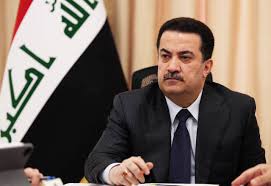Iraqi Prime Minister Announces Plan to End the Country's Dependence on Iranian Gas by 2028

Iraqi Prime Minister Mohammed Shia' al-Sudani revealed an ambitious plan aimed at ending the country's dependence on importing Iranian gas, which costs about 4 billion dollars annually, by the year 2028. The announcement came during a meeting with the "CNBC" network, where al-Sudani highlighted his country's strategy to address structural imbalances in the energy sector.
Al-Sudani clarified that the government is working on implementing a "clear vision to address the structural imbalance affecting Iraq's ability to produce and provide electricity to citizens". The core pillar of this vision is extensive investments in associated gas capture projects, which are currently wasted and estimated to be worth between 4 to 5 billion dollars annually. Agreements have been signed with major international companies such as "Total Energies" from France and Chinese and Emirati companies to invest in these projects.
Imported Iranian gas currently represents about one-third of electricity production in Iraq, yet the country still suffers from frequent power outages, forcing citizens to rely on costly and polluting private generators.
In a related context, Iraq, the second-largest producer in OPEC, seeks to achieve a delicate balance in its international relations between global and regional powers. While Baghdad maintains defensive relations with Washington, which still has about 2,500 troops on its territory, it is also opening the door for Chinese and Gulf investments to rebuild its energy infrastructure.
Al-Sudani confirmed that his government has adopted a "multi-path approach" that combines American, European, Chinese, and Gulf companies. He pointed to preliminary agreements with companies such as "Chevron", "ExxonMobil", "Halliburton", and "Schlumberger", along with Qatari investments exceeding 5 billion dollars, and Saudi and Emirati projects in renewable energy, including a project with "Masdar" to produce 1,000 megawatts of electricity.
Iraq is one of the prominent players in the global energy market, possessing the fifth-largest proven oil reserves in the world, estimated at about 145 billion barrels, according to OPEC data. These reserves are concentrated in giant fields in the south of the country, such as Rumaila, West Qurna, and Majnoon, in addition to promising reserves in the north, such as Kirkuk.
Despite this wealth, investment in oil infrastructure remains a significant challenge to increasing production, due to the need to develop extraction technologies and enhance refining and transportation capabilities.
Iraq faces an additional challenge regarding the potential consequences of the return of Western sanctions on Tehran. After European powers activated the "SnapBack" mechanism to reinstate sanctions lifted in 2015, the danger of these measures impacting the Iraqi economy, which is linked to its eastern neighbor, looms.
Observers have warned that Iran may seek to circumvent restrictions through the Iraqi banking system, especially after a number of local banks were banned from dealing in dollars earlier this year as part of an American campaign to combat money laundering and currency smuggling.
Since the "October Revolution" protests in 2019, which called for an end to corruption and foreign interventions, the current government has committed to a reform path. Al-Sudani stated: "We have started reforming the regulatory bodies responsible for combating corruption, and we have established new mechanisms to enhance transparency and procedural integrity".
He also referred to financial and banking sector reforms that contributed to "enhancing the presence of investment companies", noting the opening of a new pharmaceutical industrial city with the participation of American and British companies, in an effort to diversify the economy and create job opportunities.
With the parliamentary elections scheduled for November 11 approaching, Iraq faces a significant demographic challenge, as 60% of the population is under the age of thirty. Al-Sudani seeks to address the dual challenge of the economic crisis resulting from unemployment and the high cost of living, while simultaneously promoting political stability and ensuring free and fair elections.
Analysts emphasize that youth are the key to social and political change in Iraq, and that policies empowering them in education, employment, and vocational training could be the greatest incentive to enhance electoral participation and achieve long-term stability.
The government bets on technology and digital transformation to expand the base of public services, improve the efficiency of government administration, and facilitate youth access to the formal economy, away from the traditional oil sector, at a time when the country faces multiple economic and political pressures that make empowering youth vital for Iraq's future and stability.